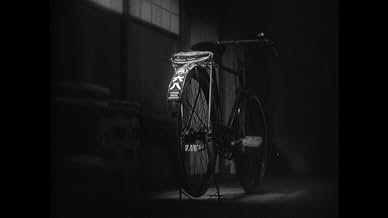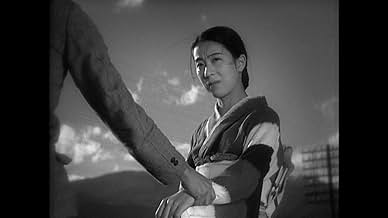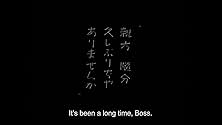IMDb RATING
7.6/10
3.7K
YOUR RATING
A kabuki actor's mistress hatches a jealous plot to bring down her lover's son.A kabuki actor's mistress hatches a jealous plot to bring down her lover's son.A kabuki actor's mistress hatches a jealous plot to bring down her lover's son.
- Awards
- 1 win total
Kôji Mitsui
- Shinkichi
- (as Hideo Mitsui)
Emiko Yagumo
- Otaka
- (as Rieko Yagumo)
Chishû Ryû
- Shouting audience member
- (uncredited)
- Director
- Writers
- All cast & crew
- Production, box office & more at IMDbPro
7.63.7K
1
2
3
4
5
6
7
8
9
10
Featured reviews
Poignant tale of family, love and social mobility in pre-WW2 Japan
Early silent film from acclaimed Japanese director Yasujiro Ozu, "A Story of Floating Weeds" is an ostensibly simple tale of the head of an itinerant troupe of Kabuki players reconnecting with his teenage son Shinkichi (Koji Mitsui). The boy, who had been told that his father was a civil servant who had died, is a student 'with prospects' and the father does not want him to know of his humble origins. As he says to one of the female players in his troupe "My son belongs to a better world than yours", which of course, is the same world as his. Although the focus of the story is on the 'master' and his secret family, there are a number of entertaining scenes featuring the troupe as they are stuck in the town with their performances rained out, broke and bored, which much of the gentle humour coming at the expense of Tomi-boh (Tomio Aoki), the little boy with the errant bladder who plays a dog in the troupe's show. I watched an English-subtitled Criterion Edition on TCM and my only criticism is that the piano score seemed (IMO) too 'Western' for the setting (but I have no idea what the original music was like). The film is a slow-moving but poignant and beautifully filmed taste of pre-WW2 Japanese life. Later audiences would have found Shinkichi's mother's statement that he'll soon be old enough for the draft much more foreboding than Ozu could have intended. Remade by the same director as "Floating Weeds" in 1959.
as interesting as the remake, and almost as good
Remakably similar in structure yet different in tonal effect to Ozu's more famous 1959 remake, this story of a travelling troupe's last days in a seaside village was one of Ozu's first forays into a quiet, rural background, though it still feels brisk compared to the more staid and sumptuous remake. The depictions of stage life are more slapstick-oriented than in the remake (most notably in Tokkan Kozo's hilarious turn in a full-sized dog costume), but are counterbalanced by sensitive portrayals of all the characters, especially the great, dignified lead performance by Takeshi Sakamoto. The romantic interludes are as powerful as in the remake, though without employing the overt sensuality of on-screen kissing; instead there appears to be the use of a filter or gauze to give the scenes between the young couple an otherworldly effect, which gives more emphasis of the idea of the actress employed to seduce the troupe leader's son enacting a "performance", an idea that I would have like to have seen developed even further. Even so, this is a marvellous work with a set of wonders distinguishable from that of the remake.
Acting up
This is one of the earliest Ozu films widely available, and the Criterion version is outstanding in quality.
Its a perfect example of Ozu at his best. Its a gem of a film - beautifully shot, a perfect structure, funny, sad and fascinating. The story is simple enough - a traveling troupe arrive at a town, not realizing the reason the chief actor picked the town is because an old flame of his lives here with his son. His current girlfriend in her jealousy tries to stir things up, but things don't turn out as either expect.
What is most striking about the film is just how modern it seems. The characters are believable and funny, the female characters are strong and willful, while even the minor characters are nicely sketched out. The acting is nothing short of brilliant, which makes the whole film very entertaining - this is no period piece of academic interest only, its a great work of art and a wonderful film - a masterpiece really.
Its a perfect example of Ozu at his best. Its a gem of a film - beautifully shot, a perfect structure, funny, sad and fascinating. The story is simple enough - a traveling troupe arrive at a town, not realizing the reason the chief actor picked the town is because an old flame of his lives here with his son. His current girlfriend in her jealousy tries to stir things up, but things don't turn out as either expect.
What is most striking about the film is just how modern it seems. The characters are believable and funny, the female characters are strong and willful, while even the minor characters are nicely sketched out. The acting is nothing short of brilliant, which makes the whole film very entertaining - this is no period piece of academic interest only, its a great work of art and a wonderful film - a masterpiece really.
One of Ozu's best silents
Warning: Some plot points are revealed in this review
One of the last silent films by Japanese master Yasujiro Ozu (later remade by Ozu himself in in color in 1959) is about a traveling kabuki troupe arriving to a small town in Japan. The troupe's leader, Kihachi (Takeshi Sakamoto) uses the occasion to meet his old lover and their grown son (who believes Kihachi is his uncle), but his current lover Otaka (pretty, ethereal Rieko Yagumo) does not appreciate this when she learns about it, so she convinces a fellow actress of the troupe to seduce Kihachi's son. Kihachi, obviously, doesn't react well either when he learns about this. Reportedly, Ozu based this film on an American film from 1928 called "The Barker".
There are few differences from the 1959 remake. For instance, here the kabuki troupe arrives to a mountain town in a train, instead of arriving to a coastal village by boat. Secondary characters are less shown. But mostly, both films are very similar, almost scene by scene, including the famous part where they are shouting over each other across a rainy street or the finale with Kihachi and his now reconciled lover drinking sake in the night train. The actor playing Kihachi, though, is about two decades younger than Ganjiro Nakamuro in the 1959 version.
Overall, this movie is not, in my opinion, as accomplished as the remake, but is still very well worth seeing, and one of the highlights of Ozu's silent films.
One of the last silent films by Japanese master Yasujiro Ozu (later remade by Ozu himself in in color in 1959) is about a traveling kabuki troupe arriving to a small town in Japan. The troupe's leader, Kihachi (Takeshi Sakamoto) uses the occasion to meet his old lover and their grown son (who believes Kihachi is his uncle), but his current lover Otaka (pretty, ethereal Rieko Yagumo) does not appreciate this when she learns about it, so she convinces a fellow actress of the troupe to seduce Kihachi's son. Kihachi, obviously, doesn't react well either when he learns about this. Reportedly, Ozu based this film on an American film from 1928 called "The Barker".
There are few differences from the 1959 remake. For instance, here the kabuki troupe arrives to a mountain town in a train, instead of arriving to a coastal village by boat. Secondary characters are less shown. But mostly, both films are very similar, almost scene by scene, including the famous part where they are shouting over each other across a rainy street or the finale with Kihachi and his now reconciled lover drinking sake in the night train. The actor playing Kihachi, though, is about two decades younger than Ganjiro Nakamuro in the 1959 version.
Overall, this movie is not, in my opinion, as accomplished as the remake, but is still very well worth seeing, and one of the highlights of Ozu's silent films.
an early masterpiece from Ozu
This film is full of the sensitive observation, the slow-building tragic emotion and the moral ambiguity of Ozu's later works. While eschewing the cheap tragedy that was already so fashionable in Japanese melodrama (you can imagine the story going in that direction for any other director), the ending leaves the viewer uncertain and unsettled, with only the vaguest hopes for all concerned.
Apart from the depiction of a rundown and pathetic acting troupe (it reminds me of Alan Mowbray's drunken Shakespearian actor in 'My Darling Clementine'), and the rural small-town atmosphere, what lingers on in the mind is the portrait of an extremely flawed man. Like the great male characters of American cinema, Ichikawa is decent but ruled by anger, regret, and a certain way of life. will Ichikawa ever really be able to change, or do justice to those he feels responsible for? But after all, actors will be actors...
In fact, if this film is to be criticized for anything, it should be done so for its lack of a really detailed look into the lives and profession of the actors. After all, Ichikawa's profession turns out to play such an important part, in the end, in the fate of his 'family'.
Ozu's direction of women (particularly Ichikawa's wronged, but vengeful, lover) is sensitive and truthful, while his his direction of children is, as always, well-observed and hilarious.
Apart from the depiction of a rundown and pathetic acting troupe (it reminds me of Alan Mowbray's drunken Shakespearian actor in 'My Darling Clementine'), and the rural small-town atmosphere, what lingers on in the mind is the portrait of an extremely flawed man. Like the great male characters of American cinema, Ichikawa is decent but ruled by anger, regret, and a certain way of life. will Ichikawa ever really be able to change, or do justice to those he feels responsible for? But after all, actors will be actors...
In fact, if this film is to be criticized for anything, it should be done so for its lack of a really detailed look into the lives and profession of the actors. After all, Ichikawa's profession turns out to play such an important part, in the end, in the fate of his 'family'.
Ozu's direction of women (particularly Ichikawa's wronged, but vengeful, lover) is sensitive and truthful, while his his direction of children is, as always, well-observed and hilarious.
Did you know
- TriviaA Moxa treatment refers to the burning of an herb called moxa (aka mugwort) on, or directly above, the skin. Recipients of the treatment generally didn't like the burning sensation on their skin, although this was supposed to enhance circulation and lymphatic flow. Also, the scent of moxa is believed to have a soothing, relaxing effect, which would have been important to counteract the skin irritation.
- Quotes
Kihachi: What did you plan to do with my son?
Otaka: Who cares about your son? He's cheap, like you, playing around with actresses.
[Kihachi beats Otaka]
Otaka: Are you sorry? I hope you'll be very sorry. The world is like a lottery. You take your ups and your downs. Let's make up please. That makes us even, you see. Just think how I feel.
- Crazy creditsThe film title and credits are placed before a backdrop of plain sackcloth. This would become a trademark of Yasujirô Ozu films.
- How long is A Story of Floating Weeds?Powered by Alexa
Details
- Release date
- Country of origin
- Languages
- Also known as
- Història d'una herba errant
- Production company
- See more company credits at IMDbPro
- Runtime
- 1h 26m(86 min)
- Color
- Sound mix
- Aspect ratio
- 1.33 : 1
Contribute to this page
Suggest an edit or add missing content

























